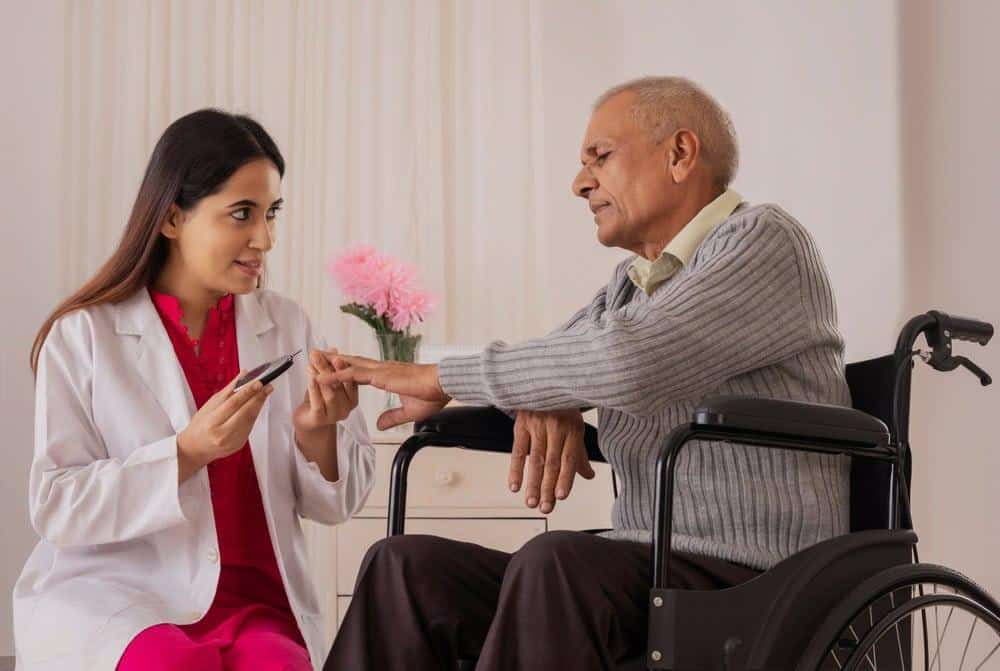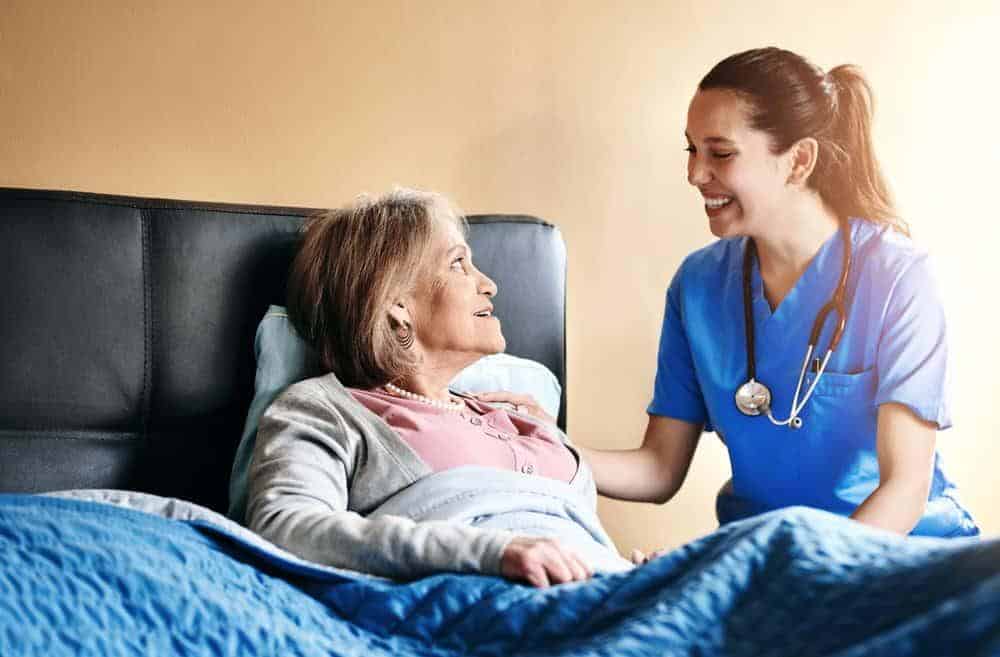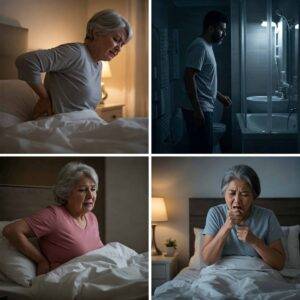
A private duty nurse is a nurse who takes care of one person at a time, usually in their home. These nurses can be registered nurses (RNs) or licensed practical nurses (LPNs), and they provide medical care to seniors who need extra help.
A private duty nurse can play an important role in caring for your beloved senior, helping them stay healthy and comfortable at home. One of the main things the nurse does is check the senior’s health regularly. This means keeping an eye on blood pressure, temperature, and other vital signs.
They also make sure your loved one takes their medicine according to the doctor’s directions, whether it’s a pill, a shot, or even through an IV. If your beloved has any wounds, the nurse will clean and bandage them to help with healing and prevent infections.
If the senior has long-term health issues like diabetes or heart disease, the private duty nurse can help manage their condition. They make sure the senior follows the doctor’s treatment plan and stays as healthy as possible.
Nurses are also there to help with medical equipment, such as oxygen tanks or catheters, to make sure everything works the way it should.
You can expect the private duty nurse to handle not only medical tasks but often help with daily activities like bathing or dressing, especially when your loved one needs assistance to do these safely.
Private duty nurses also work closely with the senior’s doctors and other caregivers to keep everyone informed about the senior’s health. If an emergency happens, like a fall or sudden illness, the nurse can give immediate care and call for more help if necessary.
How Your Loved One Would Benefit From Private-duty Nursing Care
If we look into more details, private duty nursing care can provide several significant benefits for seniors. To work in this role, the nurse must have completed nursing school, passed a licensing exam, and often has experience or training in senior care. Some registered nurses (RNs) may also have extra certifications in areas like geriatric care or dementia.
Here’s a closer look at the ways this type of care can help:
1. Personalized Care
Private duty nurses give one-on-one care, meaning their focus is exclusively on the senior they are helping. This allows them to understand your loved one’s specific needs, health conditions, and preferences. The care they provide is tailored to the individual, ensuring that every aspect of their health is managed in the best possible way.
2. Skilled Medical Care
Private duty nurses are trained professionals who know how to handle complex medical needs. They are licensed to give medications, care for wounds, and manage medical equipment like oxygen machines or feeding tubes. For seniors with chronic illnesses or those recovering from surgery, having a nurse at home means they can get the medical care they need without having to go to a hospital.
3. Comfort of Staying at Home
One of the biggest advantages is that your loved one can stay in the comfort of their own home. This is especially important for seniors who feel more relaxed and safe in a familiar environment. Moving to a nursing home or assisted living facility can be stressful, but private-duty nursing lets seniors stay where they feel most comfortable.
4. Constant Monitoring and Safety
Private duty nurses provide around-the-clock supervision, making sure that your beloved is safe and healthy at all times. This is especially helpful for those elderly who are at risk of falls, accidents, or sudden medical issues. If there’s a problem, the nurse is there to respond immediately, which can prevent serious complications.

5. Help with Daily Tasks
While private-duty nurses focus on medical care, they can also help with daily tasks like bathing, dressing, and moving around the house. This assistance is crucial if your loved one is having trouble getting around on their own but still want to stay independent. The nurse helps them with these tasks in a respectful way, keeping the senior’s dignity intact.
6. Emotional Support
Having a private duty nurse can also provide companionship. For aging people who live alone, this emotional support can play an essential role in reducing feelings of loneliness and preventing depression. The nurse can be a comforting presence, providing both medical help and someone to talk to. This support is especially beneficial for seniors dealing with anxiety, mental health issues, or cognitive problems.
7. Peace of Mind for Family
Family members often worry about the safety and health of their loved ones. Private duty nursing gives families peace of mind, knowing that a professional is always there to take care of their senior relative. This can reduce the stress and guilt that family members may feel, allowing them to spend more quality time with their loved ones.
Differences Between Private Duty Nursing and Other Types of Senior Care?
Private duty nursing differs from other types of senior care in several ways. Mainly because of the variety of needs it can address, where it is provided, and the expenses. Here’s a brief comparison of the main differences:
Personalized One-on-One Care
Private Duty Nursing
A private duty nurse works with just one person at a time, giving them their full attention. This means the senior gets care individualized to their specific needs, like help with medicine, medical equipment, or managing a health condition.
Other Senior Care
In assisted living or nursing homes, caregivers usually take care of many people at once. The care is more general, and the senior may have to follow a routine that fits everyone in the facility and does not necessarily correspond to their exact needs.
Medical vs. Non-Medical Assistance
Private Duty Nursing
Private duty nurses are licensed professionals who can provide medical care, such as administering medications, caring for wounds, and using medical equipment such as feeding tubes, oxygen management, catheters, etc. Overall, they are trained to handle more complex health needs.
Other Senior Care
Caregivers, like those in-home care or assisted living facilities, help with things like grooming, bathing, dressing, and cooking, but they don’t provide medical care. They assist with daily tasks (called “personal care”), but for serious medical needs, a nurse or doctor may be required.
Where Care Happens
Private Duty Nursing
Private Duty Nursing involves the nurse coming to the senior’s home, which allows your loved one to stay in a familiar place. This can be very comforting for seniors who don’t want to move to a facility.
Other Senior Care
Assisted living and nursing homes are places where seniors reside full-time. Care is provided there, but your beloved would have to leave their home and adjust to a new environment.

Level of Care
Private Duty Nursing
The nurses doing private duty nursing are typically registered nurses who provide high-level, skilled care. They can help manage chronic illnesses (like diabetes or heart disease) or assist after surgery. This makes private-duty nursing a good choice for seniors with serious health conditions who need more advanced care.
Other Senior Care
Caregivers in other settings often focus on helping with everyday tasks. They can assist with oral medicine administration but often are not trained to handle complicated medical issues. For seniors who don’t need medical care but still need help with things like meals, cleaning, or dressing, this type of care works well.
Costs
Private Duty Nursing
can be more expensive because the care is more specialized and one-on-one. The cost may depend on the number of hours of care needed and the type of medical care required.
Other Senior Care
Assisted living or home care services can be less expensive, but the cost varies depending on the level of care needed and the facility or service chosen.
Why Coordination Between the Medical Team and the Private Duty Nurse is Crucial
One of the important roles of private duty nurses is their close work with your loved one’s medical team to provide advanced care. They help make sure everything is managed smoothly by actively performing the following:
Following Medical Plans
Private-duty nurses are trained to not only follow the care plans that doctors set for seniors but also to create treatment plans in some instances. This might include giving medications, managing medical devices like oxygen machines, or helping with physical therapy. Sticking to the doctor’s instructions helps keep seniors healthy and safe.
Sharing Important Information
Nurses monitor important details about your loved one’s health, such as changes in symptoms, weight, or blood pressure. They regularly share this information with doctors or other healthcare providers and if they notice any issues, they report them to the medical team right away. This communication helps doctors stay updated and make adjustments to the care plan if needed.

Coordinating Appointments
Private duty nurses often help coordinate and keep track of medical appointments. They can assist with scheduling doctor visits or remind seniors to go to their check-ups. Nurses can also accompany seniors to appointments, making sure the medical team has all the information they need.
Responding to Emergencies
Suppose your loved one’s health takes a sudden turn, like if they fall or show signs of a stroke, private duty nurses are trained to respond quickly. As first responders, they can provide immediate care and contact the senior’s doctor or emergency services. This fast action can help prevent complications.
Adjusting Care Based on Medical Needs
Often, seniors’ health changes with time, and private-duty nurses are qualified to adjust the level of care they provide. They work with the medical team to change medications, therapies, or your beloved’s routines to ensure the senior is getting the best care possible. This flexibility helps seniors stay stable and comfortable as their needs evolve.
How to Assess If Your Beloved Needs Extra Care
Assessing the level of care needed for an elderly loved one involves looking at their daily needs and overall health. Here are a few guidelines on how to figure out if they need additional help.
Check Physical Abilities
Look at how well your loved one can manage everyday tasks, also known as Activities of Daily Living (ADLs).
- Can they bathe themselves, or do they need help getting in and out of the shower? Can they groom themselves?
- Are they able to get dressed, or do they need assistance with buttons or shoes?
- Can they get groceries, prepare meals, and feed themselves?
- Can they move around the house safely, or do they need help walking or using a wheelchair?
They may need more hands-on care if they struggle with several of these tasks.
Look at Medical Needs
Think about your loved one’s health condition. Does your loved one have chronic illnesses like diabetes, heart disease, or dementia that need regular attention? Do they need help reminding them to take their medications, assisting with wound care, or managing medical devices? If they do, they may require more advanced care, such as that offered by a private duty nurse.
Consider Cognitive Health
If your loved one has memory problems or conditions like dementia or Alzheimer’s disease, they may need more supervision. Look for signs of confusion, forgetfulness, or difficulty following directions. If you are concerned that they may wander or forget to turn off the stove, your beloved may need 24-hour care to keep them safe. Moreover, a private duty nurse can engage them in memory activities and thus slow down the progression of their cognitive ailment.

Evaluate Emotional and Social Needs
Your loved one may be your favorite person, but if they live alone or feel isolated they certainly would benefit from companionship. Loneliness can cause your loved one to feel depressed, or anxious, while having a caregiver or nurse to provide emotional support and engage them in activities could improve their quality of life.
Check the Home Environment
Look around your beloved senior’s home. Is it safe for them to live alone there? Are there risks of falling, such as loose rugs, poor lighting, or steep steps? If you aren’t sure how safe their home is, look at this home safety checklist. If you deem their home environment unsafe, it is a good idea to arrange help from a caregiver who can assist with housekeeping and ensure safety.
Talk to Healthcare Providers
If you aren’t sure, ask your loved one’s doctor or nurse for their input. They can offer a professional opinion on what level of care is appropriate based on the senior’s medical history and recent check-ups.
Tips for Finding the Best Private-duty Nurse for Your Loved One
Finding the best private-duty nurse for your family can feel overwhelming, but if you follow these tips, the process will prove easier.
- Ask for recommendations. Start by asking your loved one’s doctor, friends, or family members if they know any reliable private-duty nurses. Personal recommendations from people you trust can lead you to high-quality care.
- Work with a Trusted Agency. It is always better to hire through an agency as this gives you more security. Agencies with a good reputation vet the professionals they work with in advance. Read reviews about the agency online and check with local organizations to find out if the organization has a history of providing excellent care.
- Check Qualifications and Experience. This is essential, especially if you are hiring someone outside an agency. Make sure the private-duty nurse has the proper training and experience to care for your loved one’s specific needs. Look for nurses who are licensed and have experience with seniors or have worked in the past with seniors with the particular conditions your loved one may have, like dementia or diabetes.
- Conduct Interviews. Before making a decision, interview potential nurses to get a sense of their skills and personality. Ask about their experience, how they handle emergencies, and what kind of care they’ve provided in the past. You’ll want someone who is professional but also compassionate and understanding.

- Consider Compatibility. Since the nurse will be spending a lot of time with your loved one, they must get along well. Make sure the nurse’s personality and caregiving style match your loved one’s preferences. This helps build trust, comfort, and enjoyment of sharing time.
- Ask About Availability. Make sure the nurse or agency can provide the hours or type of care you need, whether it’s part-time, full-time, or 24-hour care. Flexibility is important in case your loved one’s needs change over time.
- Look for Communication Skills. Good communication is key to providing great care. Choose a nurse who communicates well with both your loved one and your family. They should be able to explain medical terms in layman’s language and keep you updated on your loved one’s condition.
- Trust Your Instincts. Lastly, trust your gut feeling. If you feel comfortable and confident in the nurse’s abilities and approach, you’ve likely found a good match. It’s important to feel that your loved one is in safe and caring hands.
Takeaway
The benefits of having a private-duty nurse are clear. Seniors receive personalized care, with the nurse focusing exclusively on their specific needs. This allows them to stay in the comfort of their home instead of moving to a hospital or nursing facility. Besides medical care, private-duty nurses also provide companionship and emotional support, which is especially helpful for seniors who live alone.
Private-duty nurses also work closely with a senior’s medical team, following care plans, managing chronic conditions, and ensuring the necessary treatment. This network of professionals helps keep seniors safe and well cared for.
To determine the best type of care for your loved one, consider their ability to handle daily tasks, their medical and mental health, and their emotional needs. This evaluation can help you decide if they need light assistance, full-time medical care, or something in between.
Experienced private-duty nurses bring expert knowledge, quick decision-making, and personalized support, helping seniors stay healthy and comfortable at home.
Finding the right care provider requires careful thought. By getting recommendations, checking qualifications, interviewing candidates, and trusting your instincts, you can select the best nursing care to meet your beloved elderly’s needs.
Working with a renowned agency or care provider, such as Amy’s Eden Senior Care can offer you peace of mind and confidence that your loved one is in capable and caring hands.
Contact us or explore our website to learn more about the types of home care we provide. Don’t forget to visit our testimonial section to see how our clients feel about entrusting their loved one’s care to us.




